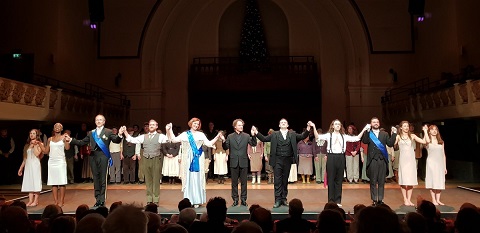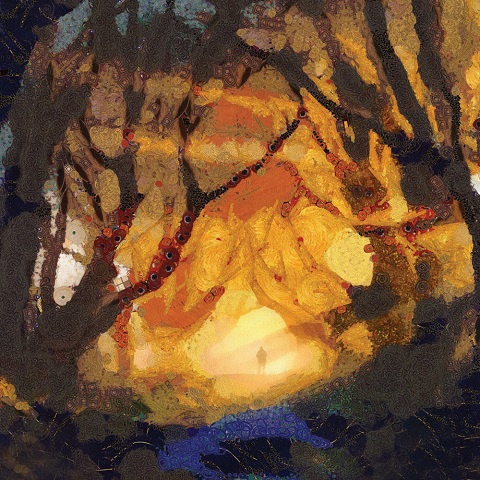The production was not well received by the Musical Times’ reviewer (June 1925), who noted that the company deserved ‘every praise for their
enterprise and, generally, for their good intentions’ in electing to
present an opera which was unduly neglected and for their ‘get things done’
spirit, but felt that the production failed to reach artistic heights: ‘The
actual task, however, proved beyond their capacity - partly through lack of
rehearsals. With a more careful and thorough preparation they would have
succeeded far better; but other interests had apparently more serious
claims on their time, and the opera suffered in consequence.’
Thorough preparation, as well as significant talent, vision and
accomplishment - allied with a ‘get things done’ pragmatism - characterised
this semi-staged performance, at Cadogan Hall, by New Sussex Opera - a
community-based company now in its fortieth year which, as this production
attests, brings together professionals, enthusiasts and volunteers to
sterling effect. And, with bravery and commitment.
The libretto of The Travelling Companion is based on a story by
Hans Christian Andersen, as adapted by Henry Newbolt. It’s a blend ofThe Magic Flute and Turandot, Parsifal and The Pilgrim’s Progress. No wonder it flummoxed
early listeners. John, made destitute by the death of his father, shelters
from a storm in a church, interrupting two reprobates who are ransacking a
grave. John stops the robbers’ sacrilegious pillage by giving them his last
pennies. His selflessness raises the dead man’s spirit, and the latter
escorts and guides John as he woos a beautiful Princess whose previous
suitors have sacrificed their lives in failing to correctly answer her
courtship riddle. The Princess is psychologically enslaved by a Wizard, but
the latter is slain by the Traveller who passes on the secret answer to
John and who thus wins her hand in marriage. Upon the fortuitous denouement
and marriage, the Companion returns to whence he came.
It’s a tale not without enchantment, but the characterisation is often
one-dimensional: the motivation of the Princess and her father, who is
determined that she must marry, is ambiguous and the Wizard himself is the
epitome of cartoon cliché. Moreover, since the Travelling Companion defeats
him in Act 3 by slicing off his head, it’s not clear why or how the Wizard
still manages to compel the Princess to continue with the riddle-ritual in
which her suitors must identify the focus of her thoughts … nevertheless,
the severed head, bloodily flourished from a hessian sack on this occasion,
does the trick for John.
Director Paul Higgins sets the opera at the time of its composition, which
seems reasonable enough. But, the Freudian effusiveness of
Higgins’ programme note - which grabs by the scruff of their collective
necks, and attempts to cohere, Arthur Rackham’s 1909 illustrations of the
tales of the Grimm Brothers, the Land Girls’ Army, the Women’s Suffrage
Movement, Egon Schiele’s sexually explicit art, and the notion that the
Princess ‘would have been drawn to the cult-like figure of an
artist-cum-therapist promising an alternative way of living’ - is less coherent.
The production doesn’t overcome all the libretto’s short-comings. Act 3 - in which we were transported to a Wizard’s den
is inhabited by the ugly 'Pied Piper' himself and his entourage of dancing
nymphets and ghastly goblins - disrupts the dramatic narrative and seems
merely an excuse for Stanford to indulge in lengthy symphonic episodes.
Isabella van Braeckal’s designs, elsewhere so economical, were less than
helpful here and exacerbated the problems. Rather than allowing us simply
to ‘imagine’ during the long instrumental interludes we treated to much
scenery shifting to supplement Stanford’s kinetic side-show. Ian Beadle’s
long-locked Wizard perched atop a step-ladder, cartoon-choreographing the
pseudo-erotic squirming and silk-waving of the sinuous dancers with
flourishes of his wand-less hands; while the chorus of gremlins, cloaked in
red and black, stood inertly staring at the choreographic indulgences. The Wizard would have had a bit more authority if the front of his shirt hadn’t been lopped away, leaving an absent bib-shaped hole.
Moreover, given that, in the absence of a pit, the orchestra took up half
of the stage, with space for the chorus to hover behind, the front-stage seemed unnecessarily cluttered with props, especially as Tom Turner’s lighting was so economical, effective and enchanting. A vivid
ultramarine floor-square created the strangeness of a world bathed in
otherworldly moonlight in Act 1, and while a ‘coffin’ might be useful, the addition of benches (church pews?) simply made for lots of to-ing and fro-ing by the scene-shifters. Such stage re-furnishing was repeatedly disruptive during the lengthy
instrumental preludes and interludes. During Act 2’s Palace Square scene,
the transmuting colours effectively conveyed evolving moods. The blood-red glow that bathed the stage told us all we needed to know about the Wizard’s machinations: and the easels,
stepladders, chiffon drapes and other paraphernalia simply resulted in cumbersome
stage business. Higgins could surely have trusted the music to do its work.
But, if there was slightly too much stage clutter at times, and Act 3 went
slightly off the musico-dramatic rails - a skid-route unhelpfully
delineated by Stanford himself - then musically and vocally, this
production set off and stayed on a straight path, driven by engaging vocal
performances and convincing dramaturgy.
One thing that was instantly noticeable was the excellent diction of both
soloists and chorus; there were no surtitles at Cadogan Hall, though the
facility exists, so perhaps costs were prohibitive, or Higgins and
conductor Toby Purser just trusted all to deliver the text cleanly and
directly, as they did.
 Cast of NSO’s The Travelling Companion.
Cast of NSO’s The Travelling Companion.
Most powerful was the central relationship between David Horton’s John and
Julien van Mellaert’s Traveller; this is the core of the opera and the two
singers made the connection both unsettling and utterly convincing.
Horton’s John was literally thrown onto the stage by an explosion of
musical and visual thunder at the start of Act 1. His wonderfully
expressive diction, lovely tone and strong characterisation were
heart-warming: we were ‘with him’ from the first, and if occasionally he
strayed a little sharp when pushing towards the end of phrases, then
Horton’s commitment ensured that such minor blemishes would be forgiven.
Van Mellaerts has impressed many times of late - not least last year at the
RCM’s French double bill
, which followed the baritone’s
Kathleen Ferrier Award First Prize. Surely a big break is beckoning. As the resurrected Fairy Godfather, Van
Mellaerts used his lovely, beguiling tone and dramatic nous to
make us warm to this Nick Shadow with good intentions. His stage presence
was finely judged: so often he appeared in a blink, leaning against a wall,
hovering at the rear, meandering through the crowd.
As the Princess, Kate Valentine sang with a fervour which was perhaps a
little unalleviated, but no less impressive for that. Ian Beadle and Felix
Kemp were splendid Ruffians, forming a dark and sumptuous blend which
overcame the blandness of Stanford’s musical characterisation of the
drama-triggering villains; and, as Beadle summoned authority as the wicked
Wizard, so Kemp was appropriately stentorian and clear as the Herald. The
role of the Princess’s Father is a tricky one dramatically, but Pauls
Putnins effected a nice shift from sternness to evidently warm affection.
The fairly small orchestra forces couldn’t really do justice to Stanford’s
quasi-Wagnerian intentions and aspirations, but that mattered not the
least. The Irish composer’s aspirations actually remain just that, and the
NSO Orchestra were secure throughout, with lovely exploitation of the
emotional dramas embodied by the low, grainy woodwind groupings. Solo
cellist Keiron Carter, harpist Isabel Harries and timpani/percussionists
Edward Scull and Ryan Hepburn added considerable expressive colour and
sentiment.
Conductor Toby Purser had the full measure of the score. The overture
summoned the innocence and idealism of Humperdinck’s Hansel and Gretel - we knew a happy ending would be assured - and
if there were not perhaps of sufficient number to sculpt the ideal strength
of sound to convey Stanford’s own Wagnerian ambitions, then the tone of the
NSO Chorus was warm and the balance between instrumentalists and choral and
solo singers was consistently excellent. Purser energised his chorus, and
shaped the instrumental lines consummately and without undue fuss. Even
though Standford’s rhythms are rather unmalleable, Purser found the
fluidity which was needed to keep things ticking along. His leadership was
an example of the sort of preparation, proficiency and good engagement with
musical colleagues that companies such as NSO need but don’t always get.
Stanford’s The Travelling Companion is melodious if not very
memorable. One senses that Stanford had the weapons in his arsenal to
produce an excellent opera but failed to get all guns firing at the same
time. That said, the large audience at Cadogan Hall were loud-voiced in
their praise and appreciation. We should be grateful to NSO for giving us
the chance to hear this opera which undoubtedly has merits and appeal.
Perhaps we can hope for a production by one of the larger houses or
festivals - at Wexford perhaps?
Claire Seymour
Stanford: The Travelling Companiont
John - David Horton, The Travelling Companion - Julien Van Mellaerts, The
Princess - Kate Valentine, The King - Pauls Putnins, The Wizard/Ruffian -
Ian Beadle, The Herald/Ruffian - Felix Kemp, Two Girls - Tamzin
Barnett/Lucy Urquhart; Director - Paul Higgins, Conductor - Toby Purser,
Designer - Isabella Van Braeckal, Lighting Designer - Tom Turner,
Choreographer - Roseanna Anderson, NSO Orchestra and Chorus.
Cadogan Hall, London; Friday 30th November 2018.

